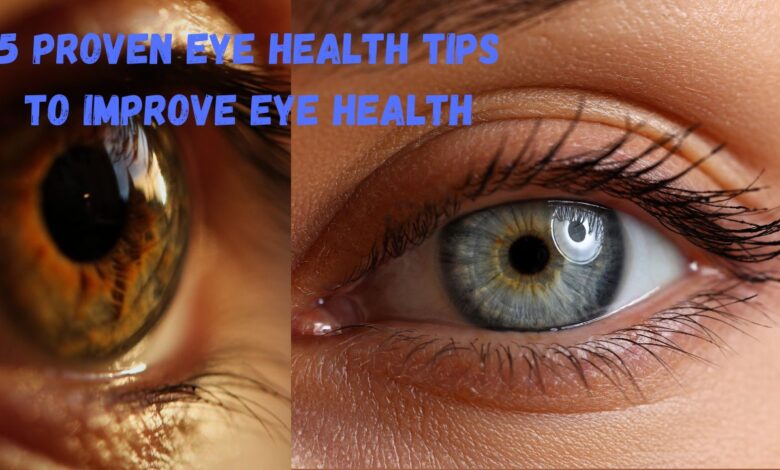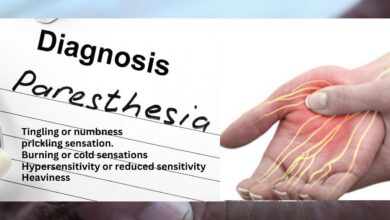
Taking care of your eye health is crucial to keep your vision sharp and ward off potential eye problems down the road. Our eyes are under more strain nowadays due to screens and the environment, so it’s important to develop habits that promote good eye health.
Here, we share five tried-and-true tips for maintaining eye health, supported by research. By following these tips, you can improve your eye health and lower your risk of issues like macular degeneration and diabetic retinopathy. By incorporating these strategies into your daily routine, you can enjoy better vision and overall well-being.
Tip #5: Watch Your Cholesterol Levels
Tip number five coming in at the bottom of the list is actually to watch your cholesterol levels and to decrease your saturated fat intake. It’s not really big medical news that hearing a high elevated level amount of cholesterol and saturated fat in the diet isn’t good for you, but it’s certainly not good for the eye health either.
There are studies that suggest having elevated amounts of cholesterol and eating high amounts of saturated fats actually contribute to the development of age-related eye diseases such as macular degeneration.
Also, having higher amounts of these levels in your bloodstream also contribute to other diseases like diabetes and high blood pressure, both of which actually contribute to different retinal diseases within the eye.
Not only are other diseases like diabetic retinopathy which can cause blindness, hypertensive retinopathy from high blood pressure that can hurt the eye health, as well as actual cholesterol plaques that get released from this cholesterol getting stuck in your arteries can actually get all the way up to the eye and cause a stroke within the eye that we call a Hollenhorst plaque.
That means decreasing the amount of foods in your diet that have elevated amounts of bad fats such as fast food or processed meats including high-fat dairy products such as milk, butter, and cheese could not just be beneficial for your whole body and heart health but also for the eyes.
This is actually compounded again by having a decreased body mass index, so getting out exercising watching what you eat is associated again with less eye health issues. We’re tip number five is to decrease the bad fats in your diet.
Tip #4: Increase Good Fats in Your Diet
Tip four is to increase the good fats in your diet, namely omega-3 fatty acids. In case you haven’t heard, omega-3 fatty acids are considered the good fats that we find in some natural food sources such as oily fish like salmon as well as from some vegetable sources including nuts and seeds.
There’s even an algae-based supplement that I’ve found that you can actually take as an alternative to taking fish oil capsules as a supplement.
Now there’s a whole lot of omega-3 debates on how omega-3 fish oils could help with heart health or joint health or even neurological brain health. There are a lot of documented studies that show support that omega-3 fatty acids can help with dry eye health symptoms as well as preventing retinal disease.
What’s really interesting is that research studies have consistently shown that people who eat a diet with higher amounts of omega-3s in them have decreased risk of developing age-related eye health diseases such as macular degeneration as well as people with diabetes.
In fact, a recent study found that people who had omega-3s higher than their diet and diabetes not only developed diabetic retinopathy less but people who did develop it, it wasn’t as severe and people who needed treatment for it responded better to the treatment.
That’s some amazing support for having omega-3s in your diet and even if you’re not diabetic there is a lot of evidence supporting that omega-3s are good for your eyes and your whole body as well.
Tip #3: Take More Foods with High Levels of Antioxidants
Tip number three is to eat more foods with high levels of antioxidants in them, that is namely fruits and vegetables. The high levels of powerful antioxidants that are found in foods like fruits and vegetables often contain high amounts of vitamin C, vitamin E, zinc, zeaxanthin as well as a very powerful eye health nutrient called lutein.
These have all been found to be very beneficial for the processes inside the eye to keep the eye healthy and prevent eye disease mainly because we are constantly looking at everything around our world.
That means the light is actually entering the eye and causing the photoreceptors within the retina to turn over and constantly regenerate and that requires a very high amount of metabolism and a faster working metabolism causes more amounts of reactive oxygen species with antioxidants basically negate.
In fact, there are actually eye health diseases like macular degeneration where its standard of care for eye doctors like me to prescribe vitamins because it helps those diseases so much. So yes, just as you’ve probably heard throughout your entire life, eat your fruits and veggies.
Tip #2: Consider Taking Eye Vitamin Supplements
Tip number two is to consider taking some sort of eye vitamin supplement. If you’re somebody who doesn’t like eating fruits and vegetables and you can’t really stomach eating oily fish like salmon, then perhaps taking some sort of supplement is the best option for you.
There are many different vitamins you can find on the market. If you go to the store, you’ll probably be overwhelmed by the amount of options that you have for eye vitamins. In general, you’ll probably see ones with the words AREDS written on the side.
That stands for the Age-Related Eye Disease Study. Those are all large-scale studies that basically proved and found the benefit of using a vitamin supplementation for diseases like age-related macular degeneration.
If you’re somebody who’s never been diagnosed with a disease like that, you probably won’t have much benefit from taking that specific formulation, but there are different vitamins out there to supplement for your eye health.
I personally take an eye vitamin every day from I Promise called I Promise Restore, which is more formulated to prevent age-related eye diseases mainly by increasing what’s called the MPOD, which stands for macular pigment optical density. It’s really the amount of structural support pigmented layer in the back of the eye.
By taking these vitamins, you increase the amount of that pigment and that helps prevent aging eye disease mainly by preventing damage from high-energy light that we get from the sun and digital devices.
I personally still think it’s best to try and eat healthy foods and get all of your nutrients naturally instead of supplements, but I still think it’s a good option for those who maybe are concerned or have higher risk for retinal or eye disease. But I do also want to mention if you’re considering taking some sort of vitamin supplement, make sure you talk to a medical professional in your area to make sure that it is right for you.
Tip #1: Quit Smoking
Now my number one tip for improving eye health to preventing eye disease is something that I know a lot of people are not going to like to hear, and that is to quit smoking.
That is because cigarette smoking and tobacco use in general is associated with higher risk factors of developing eye diseases such as macular degeneration, again a blinding eye disease that people get in their 50s and beyond, as well as development for things like dry eyes, uveitis, a bad inflammation inside the eye, as well as a condition called thyroid eye disease.
So if you have any sort of thyroid problems for yourself or in your family, smoking very greatly exaggerates problems with your thyroid.
But the reality is it’s really no big news that smoking can cause a lot of problems in your entire body. I mean, it’s written warning right on the side of the box.
But I do know that quitting smoking is one of the hardest things you can do and I do encourage you to reach out to a medical professional in your area in case you can get medication from them or counseling services that they could recommend so that they can help you quit. And if you or a friend or one of your family members maybe need some extra motivation on how to quit smoking.
Also Read: 10 Hidden Power of Barley Water: Unlocking Its Secret Health Benefits
Conclusion
By following these five reliable tips for maintaining good eye health, you can enhance your vision and shield your eyes from diseases. Simple adjustments like keeping your cholesterol in check, adding more omega-3 to your diet, eating foods rich in antioxidants, and thinking about taking eye supplements can all contribute to healthy eyes.
However, the most significant change you can make is to stop smoking. This single action can drastically decrease the likelihood of developing different eye problems.




